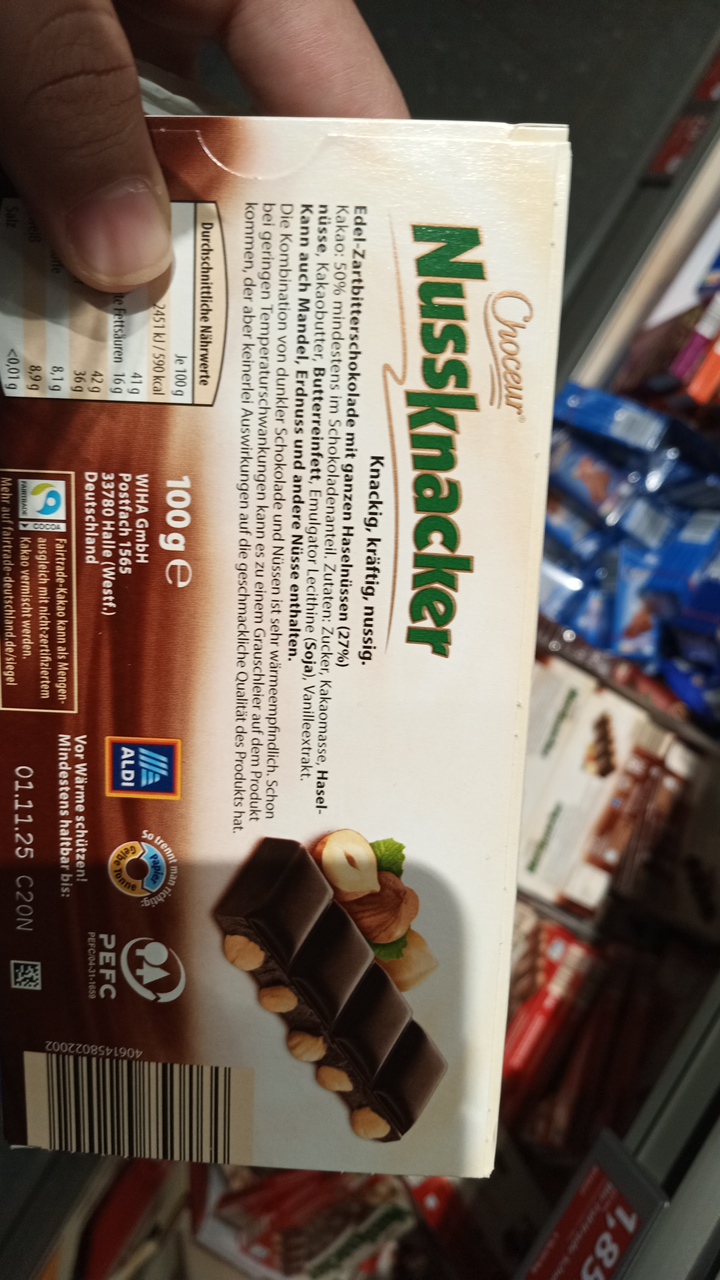
Barcode: 279526
nussknacker
HALAL
📝 Reason: Based on the provided ingredient list and Halal/Haram Ecode mappings, the majority of the ingredients are plant- or milk-derived, which are Halal. However, vanilla extract is marked as Doubtful due to its common use of alcohol in the extraction process. According to Islamic rulings (Quran 5:3), anything with uncertainty in Halal status (especially with possible alcohol) should be avoided without certification. Therefore, Halal_Result is 2 for this product based on strict rules, even though no Haram (forbidden) ingredients are present. Sources: IFANCA, HalalHaram.org.
🏷️ Category: Chocolate
📄 Certificates: Fairtrade, Pefc, So Trennt Man Richtig, Vegetarisch
Ingredients:
Details
Exploring the Halal Status of Nussknacker
Nussknacker, a delicious chocolate treat, is a popular choice among sweet lovers. However, for those following halal dietary laws, it’s essential to determine whether this product aligns with their beliefs. In this article, we will dive deep into Nussknacker’s ingredients, E-numbers, and halal status.
What is Nussknacker?
Nussknacker, a delectable chocolate blend, typically features a variety of ingredients, including dark chocolate, hazelnuts, cocoa, sugar, and more. It appeals to those who appreciate rich flavors and textures.
Halal Status Overview
The halal status of Nussknacker is officially marked as HALAL, based on an examination of its ingredients. Most components are plant-derived or dairy-based, which generally adhere to halal guidelines. However, we will explore each ingredient in detail to substantiate its halal suitability.
Ingredient Breakdown
- Edel-zartbitterschokolade (Fine Dark Chocolate): This luxurious dark chocolate usually consists of cocoa, sugar, and butterfat, making it typically halal if it doesn’t contain any alcohol or animal by-products. [Source]
- Haselnüsse (Hazelnuts): Naturally, unprocessed hazelnuts are halal. [Source]
- Kakao (Cocoa): Cocoa extracted from cocoa beans is halal. [Source]
- Zucker (Sugar): Refined sugar is usually halal unless processed with bone char, which is not prevalent in Europe. [Source]
- Kakaomasse (Cocoa Mass): Cocoa mass is a fundamental ingredient in chocolate production and is halal. [Source]
- Butterreinfett (Clarified Butterfat): Derived from cow’s milk, this ingredient is usually halal unless mixed with non-halal enzymes or alcohol, which is rare in chocolate production. [Source]
- Emulgator Lecithine (Soja) (Soy Lecithin): This plant-derived emulsifier is halal. [Source]
- Vanilleextrakt (Vanilla Extract): Vanilla extract is marked as doubtful due to the potential of alcohol in its extraction process. Unless it is certified alcohol-free, its halal status should be viewed cautiously. [Source]
- Mandel (Almond): Almonds are a natural, halal ingredient. [Source]
- Erdnuss (Peanut): Peanuts are plant-based and thus halal. [Source]
- Nüsse (Nuts): Unprocessed nuts are halal by default. [Source]
Certification and Assurance
Alongside its ingredients, Nussknacker carries several certifications, including Fairtrade and PEFC, which add layers of assurance regarding its ethical sourcing and production practices. Though the vanilla extract presents a point of cautious consideration, the rest of the ingredients promote its halal status effectively.
Conclusion
In summary, while the presence of vanilla extract brings a questionable element to the halal status of Nussknacker, the comprehensive examination and absence of explicitly haram ingredients suggest it largely adheres to halal principles. If you’re looking for a chocolate treat that aligns with your dietary needs, make sure to stay informed about the ingredients and certifications. Always look for products that explicitly label their halal certification!
